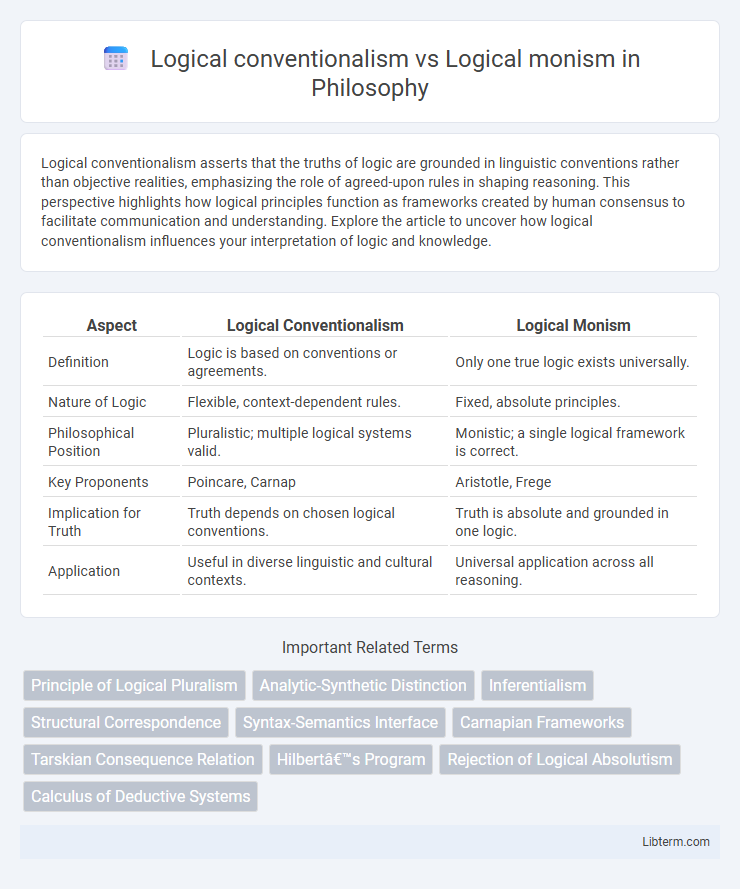Logical conventionalism asserts that the truths of logic are grounded in linguistic conventions rather than objective realities, emphasizing the role of agreed-upon rules in shaping reasoning. This perspective highlights how logical principles function as frameworks created by human consensus to facilitate communication and understanding. Explore the article to uncover how logical conventionalism influences your interpretation of logic and knowledge.
Table of Comparison
| Aspect | Logical Conventionalism | Logical Monism |
|---|---|---|
| Definition | Logic is based on conventions or agreements. | Only one true logic exists universally. |
| Nature of Logic | Flexible, context-dependent rules. | Fixed, absolute principles. |
| Philosophical Position | Pluralistic; multiple logical systems valid. | Monistic; a single logical framework is correct. |
| Key Proponents | Poincare, Carnap | Aristotle, Frege |
| Implication for Truth | Truth depends on chosen logical conventions. | Truth is absolute and grounded in one logic. |
| Application | Useful in diverse linguistic and cultural contexts. | Universal application across all reasoning. |
Introduction to Logical Conventionalism and Logical Monism
Logical conventionalism asserts that the foundations of logic are based on agreed-upon conventions or linguistic choices rather than objective truths, emphasizing the role of human decision in the selection of logical systems. Logical monism maintains that there is a single, true logic governing valid reasoning, reflecting an objective and universal standard independent of human conventions. The distinction hinges on whether logic is viewed as a matter of subjective agreement or an inherent feature of reality.
Historical Background and Key Figures
Logical conventionalism emerged in the early 20th century, influenced by philosophers such as Henri Poincare and Ludwig Wittgenstein, who argued that the principles of logic are based on conventions rather than empirical facts. Logical monism, championed by figures like Gottlob Frege and Bertrand Russell, maintained that logic represents a singular, objective truth essential to mathematics and philosophy. The historical debate between these views shaped foundational discussions in analytic philosophy and the philosophy of mathematics.
Fundamental Concepts: Logic, Convention, and Monism
Logical conventionalism asserts that the principles of logic are based on human-made conventions and linguistic agreements, emphasizing the role of societal norms in shaping logical systems. Logical monism holds that there is a single, objective, and universally valid logical system grounded in an inherent structure of reality, independent of human choice. Central concepts include logic as a formal system, convention as the basis for logical rules in conventionalism, and monism as the belief in one absolute logical truth.
Core Arguments of Logical Conventionalism
Logical conventionalism argues that the principles of logic are not empirically true or false but are grounded in linguistic conventions and agreements within a community. It holds that logical laws serve as rules for the use of logical symbols rather than descriptions of an objective reality, emphasizing the flexibility and context-dependence of logical systems. This contrasts with logical monism, which asserts the existence of a single, universal logical system applicable in all contexts without variation.
Core Arguments of Logical Monism
Logical monism asserts that there exists a single, true logic governing all valid reasoning, emphasizing the universality and objectivity of logical laws. It argues that logical truths are not contingent on linguistic or cultural conventions but are necessary and immutable principles underpinning rational thought. This position challenges logical conventionalism by rejecting the notion that multiple, equally valid logical systems can coexist based on differing pragmatic or social agreements.
Comparative Analysis: Strengths and Weaknesses
Logical conventionalism emphasizes the adaptability of logical systems based on linguistic or pragmatic conventions, offering flexibility in addressing diverse philosophical problems but risking relativism and lack of universal applicability. Logical monism asserts a single, true logical framework grounded in objective reality, ensuring consistency and universality yet potentially limiting responsiveness to context-specific nuances. Comparative analysis reveals that conventionalism excels in pluralistic and interdisciplinary settings, while monism provides a firm foundation for formal sciences but may struggle with evolving conceptual frameworks.
Implications for the Philosophy of Logic
Logical conventionalism asserts that the principles of logic are not absolute truths but conventions adopted for practical coherence, implying that logical frameworks are context-dependent and subject to revision. Logical monism posits a single, objective logical system underlying all reasoning, suggesting that logic reflects a universal structure inherent to reality. The debate shapes the philosophy of logic by challenging the nature of logical truths, influencing how logical systems are justified, applied, and understood within philosophical inquiry.
Case Studies and Logical Systems
Logical conventionalism argues that the choice of logical systems depends on linguistic or practical conventions, as demonstrated in case studies involving the adoption of classical versus intuitionistic logic in constructive mathematics. Logical monism maintains a single, correct logical system, often classical logic, which is supported by case studies highlighting its universal applicability in formal proofs and computational logic. These perspectives directly influence the development and evaluation of logical frameworks, shaping theories in both philosophical logic and computer science.
Criticisms and Contemporary Debates
Logical conventionalism faces criticism for its reliance on language conventions, which some argue leads to a form of relativism undermining objective truth in logic. Critics of logical monism challenge its assertion of a single, absolute logical system, highlighting difficulties in addressing diverse logical frameworks like intuitionistic or paraconsistent logics. Contemporary debates center on the balance between normative standards and descriptive flexibility, exploring how logic can maintain universality while accommodating pluralistic approaches.
Conclusion: Future Directions and Unresolved Questions
Logical conventionalism, asserting that the choice of logical systems is based on conventions or agreements, highlights flexibility in logic's application but leaves unresolved questions about objective criteria for system selection. Logical monism, advocating for one true, universal logic, faces challenges in accommodating diverse reasoning contexts and emerging non-classical logics. Future research must explore integrating pluralistic frameworks with rigorous foundational principles to address these philosophical tensions and expand logic's applicability in evolving scientific and computational domains.
Logical conventionalism Infographic

 libterm.com
libterm.com